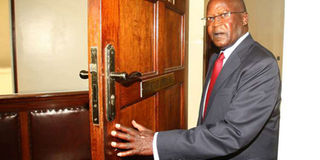Time running out for Uhuru to appoint Tunoi tribunal

Judge Philip Tunoi at the Supreme Court in Nairobi on February 1, 2016. A former radio broadcaster Geoffrey Kiplagat, in a sworn affidavit, had accused Justice Tunoi of having received a Sh202 million bribe from Nairobi County Governor Dr Evans Kidero to influence the election petition judgment in his favour. PHOTO | EVANS HABIL | NATION MEDIA GROUP
What you need to know:
- The JSC, having submitted to President Uhuru Kenyatta a petition for formation of a tribunal on February 9, Article 168 (5) requires the President to appoint the tribunal within 14 days after receiving the resolution.
- Neither Mr Esipisu nor the senior director of public communication at State House Munyori Buku could be reached for a comment.
State House has remained tight-lipped over the fate of embattled Supreme Court Judge Philip Tunoi as the deadline for appointing a tribunal to investigate accusations of impropriety against him draws to a close.
The Judicial Service Commission (JSC), having submitted to President Uhuru Kenyatta a petition for formation of a tribunal on February 9, Article 168 (5) requires the President to appoint the tribunal within 14 days after receiving the resolution.
The 14 days since JSC submitted the petition end on Tuesday, February 23.
A former radio broadcaster Geoffrey Kiplagat, in a sworn affidavit, had accused Justice Tunoi of having received a Sh202 million bribe from Nairobi County Governor Dr Evans Kidero to influence the election petition judgment in his favour.
In recommending the formation of the tribunal, JSC on February 5 said it was “satisfied from the totality of the material and information presented before it that there was inappropriate interaction and communication between the Hon Mr Justice Philip K. Tunoi and agents of a litigant in a matter pending before the Supreme Court.”
Justice Tunoi has denied the bribery allegations and reiterated his innocence against the “false accusations that have been made against him. The judge will appear before the tribunal once it is established,” he said after the JSC recommended his suspension and formation of a tribunal to investigate the accusations.
Going by the speed with which he formed the Havelock Tribunal to investigate the conduct of former Ethics and Anti-Corruption Commissioners Mumo Matemu and Irene Keino, and another one investigating the conduct of suspended judge Joseph Mutava, lawyers and the public are baffled at President Kenyatta’s lack of speed in acting on the Tunoi petition.
Last week State House spokesperson Manoah Esipisu said the delay in the appointment of the tribunal was because “the investigation files were missing” from what the JSC sent over with its recommendation.
FALSE
JSC countered that State House was being insincere. “We state for the record that the commission sent the following documents to the Head of State on February 9, 2016, which were duly received and signed for at the Office of the President: transmittal letter, petition and report of the findings of the commission on the allegations of bribery against Justice Philip Tunoi,” Dr Naim Bilal, the judiciary’s director, public affairs & communication, said.
“JSC reiterates that it fully satisfied the provisions of Article 168 (4) of the Constitution on the content and procedure of such a petition to the President. Importantly, this is not the first petition of this nature that the JSC has processed. Further, JSC has neither received any communication from the Head of State on the matter nor a request for additional information,” he added.
Lawyer Paul Muite says “Esipisu was talking nonsense when he said there were documents JSC had not forwarded. Evidence for removal is evaluated by the tribunal not the President. Esipisu is therefore wholly wrong in insinuating the president has a role in evaluating the adequacy or otherwise of the evidence in support of the petition by JSC.”
Mr Muite’s sentiments have been reiterated by lawyer Haron Ndubi who also holds that the president has no authority to demand to see the evidence.
Neither Mr Esipisu nor the senior director of public communication at State House Munyori Buku could be reached for a comment.




